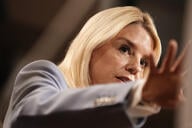You have /5 articles left.
Sign up for a free account or log in.
Of all the issues in Iraq, the University of Alberta is tackling one need this month that may, in some ways, seem universal: the need to improve science instruction.
Alberta is hosting 14 Iraqi biology and chemistry professors for a 17-day workshop on teaching science, with a focus on improving and updating subject area knowledge and learning new teaching methodologies, approaches to assessment and instructional design, says George Richardson, associate dean of international initiatives for Alberta's Faculty of Education. Alberta is the only North American university in a consortium of six institutions outside Iraq – Cairo University, Queens University Belfast and the Universities of Alberta, Buckingham, Foggia (in Italy) and Wales – that comprise the United Nations Educational, Scientific and Cultural Organization (UNESCO)-funded Teacher Training Network for Iraq, Richardson explains.
“The idea,” he says, “was to upgrade, reform and modernize post-secondary education in Iraq.”
Since its formation nearly two years ago, the participating colleges have hosted workshops for Iraqi academics on technology training, English language and, now, classroom instruction, Richardson says -- although the ongoing workshop for biology and chemistry professors is Alberta’s first. Here in Edmonton, with outdoor temperatures of minus 6 degrees (Celsius), the 14 professors have discussed such topics as the inquiry (rather than lecture-based) approach to teaching science, and are touring labs and hearing lectures to learn about new research developments.
“We spent most of our time in the university, the classroom, the library and the computer lab, trying to get new experiences from the people here so that we can take it back home and make a course for training teachers in our university,” says Niran Al-Salihi, an assistant professor of chemistry at the University of Basrah, in southern Iraq. Her colleague, Mustafa Al-Attar, head of the ecology department and director of scientific affairs in Salahaddin University in the Kurdistan region, adds that he expects to be offering lectures to other instructors to pass along what he’s learned about reforming the curriculum.
But the transfer of pedagogical knowledge won’t be easy in resource-starved Iraq right now, Al-Salihi says, and change will take time. Since the war started, for instance, she says many high school science classes have stopped conducting laboratory experiments – providing a new challenge for instructors when those students come to college.
“It’s not very safe now,” she adds of the middle and south of Iraq. “Sometimes, it’s going maybe for a week or a month that nothing happens, but then one day everything gets changed.”
“We’re delighted that we’re working with the Iraqi professors, that they’re interested, really enthusiastic about what they can do but at the same time, they know their limitations when they go back. The conditions they’re working in once they go back are certainly conditions that I would have difficulty working with,” says Richardson. The professors return to Iraq on Thursday, and as for next steps forward, Richardson says a fellowship program is planned.
“This relationship needs to continue; we hope that this course is not the end of everything,” Al-Salihi says.




